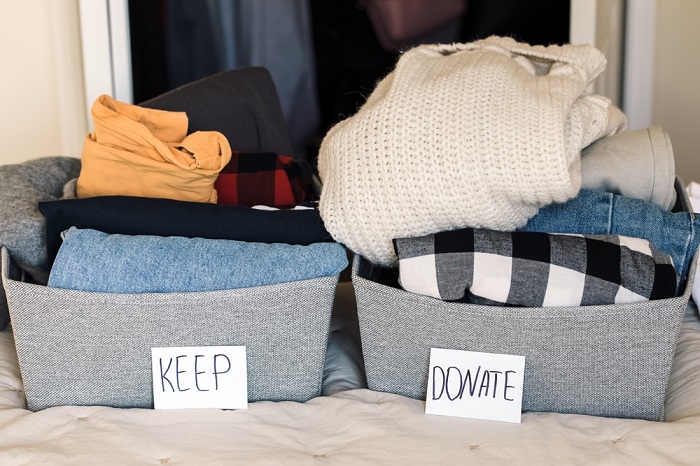Fall feels like the season of great change. Students return to school, summer attractions like amusement parks begin operating on modified schedules, and the bountiful harvests of spring and summer give way to winter. Maybe that’s why fall is a popular season for moving into a new apartment!
If you fall (no pun intended) into this category, you have plenty on your mind, such as knowing when apartment rent is due, installing new utilities, and updating addresses on bills. For all that must be done, there’s plenty that should be avoided. You wouldn’t want to add unnecessary headaches to an already stressful process. Here are a few things you should not do when you move into an apartment during the fall season.
Overlooking Your Movers
A moving company can be extremely helpful, but you shouldn’t just pick one without any research. Just because the company has a flashy ad or catchy jingle doesn’t mean it’s reliable. Search online for reviews. Ask friends who they recommend. Try to find a company with a solid reputation, regardless of price. It may cost more in the short term, but the security and protection of your belongings are worth the expense. And don’t forget about moving insurance!
Forget Utilities
Unless you know someone else is moving into your old home shortly after you vacate it, the utilities will still be on. Even if nobody’s there to use them, the water, heat, and electricity will keep running. Make sure to turn everything off when you move. Inform the utility companies of your move early. You’ll want to familiarize yourself with and set up your new utilities as well, even if the apartment’s landlord will do most of the heavy lifting.
Neglect a Moving Checklist

Some people find having a to-do list very helpful for everyday tasks. Even if you’re not one of those people, prepping a moving checklist will help the process go smoothly. It could be just for moving day, or it could be a full schedule for the months leading up; tailor it to your personal preference. You may also want to add times to ensure there are no delays on moving day.
Skip a First-Day Box
Unless you’ve been gradually bringing boxes over to the new apartment, everything will still be packed when you finally settle into your new home. That’s all well and good until you realize that things you desperately need are buried in a box somewhere. You need a plate, your laptop, and a garbage bag – and not one is within reach.
Set aside a box to fill with essential items like toiletries, paper products, and a spare change of clothing. Some essentials also include dishes that are necessary for the first meal you have in your new home. This will give you easy access to the items you regularly use without digging through everything else. It’ll also prevent any additional spending on products you already own.
Forget to Measure the Apartment
This step is especially critical if you’re going from a full-sized house to an apartment. The dimensions are going to be smaller. Take time to measure your new apartment and your furniture as well. You may find that your five-piece sectional won’t fit in your new living room. Buying new furniture is less than ideal, but it’s better to find out before moving day.
Hoarding

Much like the above tip, a downgrade in size means minimizing what you have. Essential furniture and family heirlooms are must-haves, but you should reconsider other clutter. Does this chair serve a functional purpose, or is it too large and bulky to bring along? Is it necessary to keep a pile of books you’ve never read?
If you decide to let these items go, you’ll also need to decide if you should donate them, trash them, or place them into storage. Check with local donation centers to see what items they accept. Review what disposal laws apply to any electronics or larger items. If you’re opting for storage, see if your apartment complex has a storage facility nearby or is partnered with one – it may be possible to get a discounted rate.
Skip Renters Insurance
As the name implies, there’s a difference between homeowners and renters insurance. Under homeowners insurance, any damage dealt to the residence or the personal items within is covered by the insurance company. Renters insurance will protect belongings, but not any damage done to the building itself. Instead, that’s typically taken from the deposit paid upon rental.
Also, most apartment complexes or communities require their tenants to have renters insurance. If you don’t have insurance, you’re unable to rent from them. This doesn’t apply to people who buy or own the apartment, but the typical resident only rents. Before moving in, talk to your new landlord about what insurance companies they recommend. Alternatively, you can do your own research to find the perfect fit for your household.
Forget to Label Your Boxes
Similar to the first-day box, there’s nothing as infuriating as opening a box filled with the wrong items. You could’ve sworn this box was full of kitchen utensils, but instead, you’ve found a collection of holiday sweaters. Labeling your boxes will ensure each box goes to the appropriate room. This will help streamline the unpacking process. A fancy label maker isn’t even necessary; simply writing the room or contents on the box with a permanent marker should do the trick.
Forgetting Taxes

Even if you’re only moving one town over, your taxes are inevitably going to change. Some may believe that certain taxes apply only to homeowners, not renters, and vice-versa. This isn’t true. Taxes cover, among other things, school districts, public transportation, amenities like parks and libraries, and public safety measures. Make sure you’re aware of what changes to your local taxes will occur after you move. A sudden jump in taxes will add extra pressure if you’re not prepared for it. And if you haven’t already done so, use a moving comparison tool to help you decide how much the cost of living differs from your old residence to your new one.


